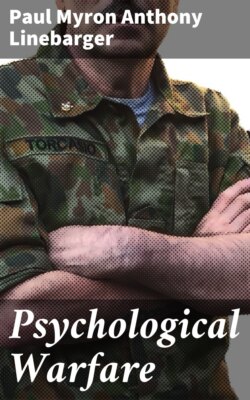Читать книгу Psychological Warfare - Paul Myron Anthony Linebarger - Страница 25
На сайте Литреса книга снята с продажи.
CHAPTER 3
Definition of Psychological Warfare
ОглавлениеTable of Contents
Psychological warfare seeks to win military gains without military force. In some periods of history the use of psychological warfare has been considered unsportsmanlike.12 It is natural for the skilled soldier to rely on weapons rather than on words, and after World War I there was a considerable reluctance to look further into that weapon—propaganda—which Ludendorff himself considered to be the most formidable achievement of the Allies. Nevertheless, World War II brought a large number of American officers, both Army and Navy, into the psychological warfare field: some of the best work was done without civilian aid or sponsorship. (Capt. J. A. Burden on Guadalcanal wrote his own leaflets, prepared his own public-address scripts, and did his own distributing from a borrowed Marine plane, skimming the tree tops until the Japanese shot him down into the surf. He may have heard of OWI at the time, but the civilians at OWI had not heard of him.)
Psychological warfare has become familiar. The problems of psychological warfare for the future are problems of how better to apply it, not of whether to apply it. Accordingly, it is to be defined more for the purpose of making it convenient and operable than for the purpose of finding out what it is. The whole world found out by demonstration, during World Wars I and II.
Psychological warfare is not defined as such in the dictionary.13 Definition is open game. There are three ways in which "psychological warfare" and "military propaganda" can be defined:
first, by deciding what we are talking about in a given situation, book, conversation, or study course;
second, by determining the responsibilities and authority involved in a given task;
or third, by stating the results which are believed to be accomplishable by the designated means.
Plainly, the staff officer needs a different definition from the one used by the combat officer; the political leader would use a broader definition than the one required by soldiers; the fanatic would have his own definition or—more probably—two of them; one (such as "promoting democracy" or "awakening the masses") for his own propaganda and another (such as "spreading lies," "corrupting the press," or "giving opiates to the people") for antagonistic propaganda.14 Definition is not something which can be done once and forever for any military term, since military operations change and since military definitions are critically important for establishing a chain of command.
The first method of definition is satisfactory for research purposes; it may help break a politico-military situation down into understandable components. The second method—the organizational—is usable when there exists organization with which to demonstrate the definition, such as, "Propaganda is what OWI and OSS perform." The third method, the operational or historical, is useful in evaluating situations after the time for action has passed; thus, one may say, "This is what the Germans did when they thought they were conducting propaganda."
Since the first lesson of all propaganda is reasoned disbelief, it would be sad and absurd for anyone to believe propaganda about propaganda. The "propaganda boys" in every army and government are experts at building up favorable cases, and they would be unusual men indeed if they failed to work up a fine account of their own performance. Propaganda cannot be given fair measurement by the claims made for it. It requires judicious proportioning to the military operations of which it is (in wartime) normally a part.
